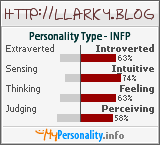Reading all of his work has been estimated to take two and a half years if one was to read 60 pages a day. The enormous amount of writing Wundt did also made it hard to criticize him. His arguments had often changed or he had revised an edition of a book by the time a critic was ready to present their criticism. (Schultz, 1975).
I usually never say things like this about anybody. But I like this man.
His methods,
1. Introspection.
Well, nothing special there. Introspection began when Socrates told people to "KNOW THYSELF". That's more than 2000 years ago.
The concept of introspection was not invented by Wundt but his experimental control of its use was original. (Schultz, 1975). "
Introspection does not merely involve self-reflection but for Wundt was a rigorous process that involved extracting the most simple of sensations and feelings from the conscious experience. The goal was to describe an experience without interpreting what was happening.Well, this is dangerous. Words are dead. Words carry abstract, untangible, dead concept that can be(and is) interpreted in various ways depending on the individual's associations(his own experience) with the words. It'd very dangerous to think that one can truly understand others by the words they are uttering. Words are frequently subjective. And even if there were concrete, objective meanings to the words, people do not care to know about them. (If you do, put your hands up and I will chop them off. Whoa!)
What had to be described was the intensity, the duration, the mode (what sense was involved e.g. hearing), and quality (e.g. a shape) of the sensation. Along with reporting the dimensions of the sensations, the feelings that accompanied the sensations was also to be analyzed. Feeling could be described on the following three dimensions: pleasant or unpleasant, tension or relaxation, and activity or passivity."
For instance,
The word "happiness".
According to freedictionary.com
happiness is the state of well-being characterized by emotions ranging from contentment to intense joy.
However, my own view of the word happiness does not involve the "intense joy" or plain "contentment". To me, intense joy equals ecstasy, delirium. And contentment equals placidity and peace.
People may differ in their views on this. And thus it would be abstruse for me to say that I'm happy and expect people to understand what I truly mean.
And thus, this
"Feeling could be described on the following three dimensions: pleasant or unpleasant, tension or relaxation, and activity or passivity."
I would say is flawed.
2. Distancing himself from the philosophical ideas(body/soul)
This I like.
3. To Wundt psychology was the science of experience and studying psychological phenomenon
What can I say, I'm a rationalist and science impresses me.
Wundt’s students had to be thoroughly trained in introspection and not all of them were able to master the skills required to do it. (Fancher, 1979). Before a student’s introspection accounts were taken seriously they would have had to make around 10,000 introspection observations. (Schultz, 1975).
The person who was doing the introspection, the observer, would be fully aware of when and what stimulus would be presented to them. This ensured that the observer was in full control of the experience. The stimulus would then be presented numerous times. (Hothersall, 1984).
I don't get this. So it's impossible to be introspective if the experience is spontaneous? Isn't the spontaneity the best way to bring out the most conventional emotional reactions? And who says that spontanueous feelings are not real? why should they be ignored? -> Of course, I'm merely yapping. This inattentiveness towards the spontaneity is probably one of the reasons why this theory is not used in the professional world today.
Germany perhaps had certain characteristics that influenced the evolution of Wundt’s experimental psychology. Experimental physiology had been practiced for decades in Germany but not to the same extent in other parts of Europe. A tradition of methodical and systematic observations and record keeping could therefore easily be transferred to the study of psychology.
While other countries were more prudent in there definitions of science, looking mainly at what could be defined quantitatively, Germans were willing to analyze everything from physics to phonetics. Germany in the nineteenth century could be argued to have been an ideal setting for the founding of psychology and Wundt chose to be the one to do it. (Schultz, 1975).
* Wilhelms' theories are not used today.
How are they not used today? (hehe, he probably means it's not used in the professional world but I'm still going to nag and offend for the sake of it)
I see them being used by people everyday. Of course it would be arrogant of me to judge them and laugh at them for not being able to understand the complexity of mind and behavior as all they know or ever pay attention to is the "sensation+feeling". As Le bon would say, crowds don't think.
And that's what the world is consisted of. Millions of crowds.
Now, this may make me sound like I'm judgemental and arrogant. I do not care. I am judgemental and arrogant.
Reference
:http://wilhelmwundt.com/wilhelm-wundt-psyhology5.php

No hay comentarios:
Publicar un comentario